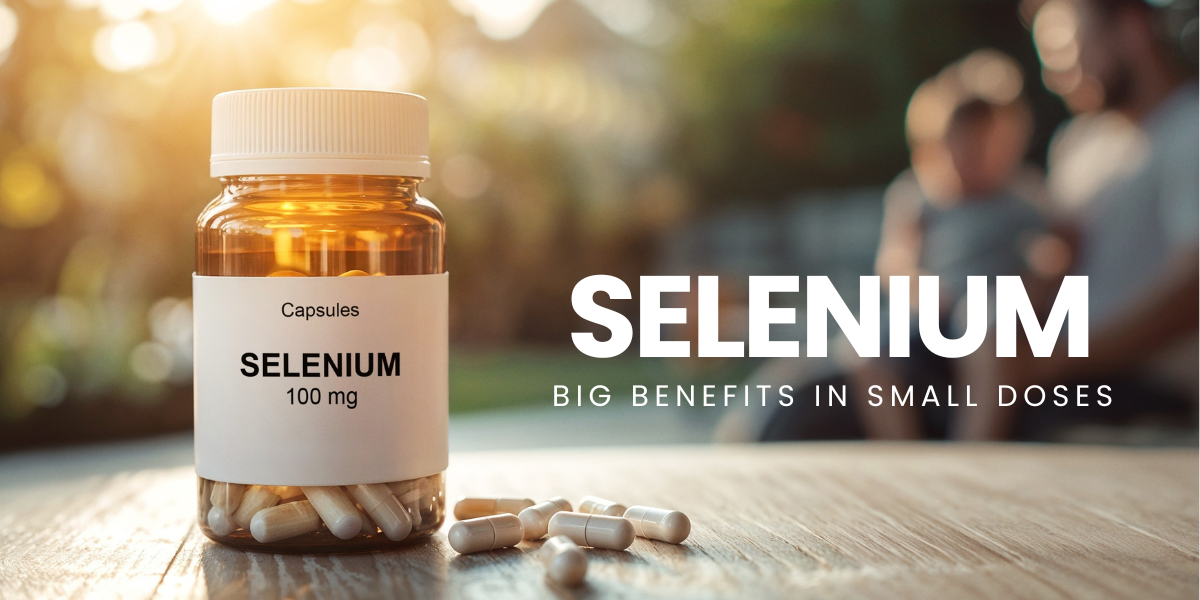Don’t Overlook Selenium: The Small but Mighty Mineral
When it comes to overall health, the smallest nutrients often play the biggest roles in your health, and that’s why none of the essential vitamins and minerals should be overlooked even when they aren’t talked about as often. Selenium is one that we always like to emphasize with patients, especially on their healing journey through our intensive program. Though your body only needs trace amounts, this mineral has significant effects on your immune system, thyroid function, and overall well-being.
Selenium is an essential mineral, meaning your body cannot make it on its own, and you must get it from food or supplements. Its most significant role in the body is being a cofactor for antioxidant enzymes, especially glutathione, which protects your cells from oxidative stress. If you are a patient at Sanctuary, you know how much we love and emphasize glutathione for detox!
Here are some of the key benefits of selenium:
Thyroid & Hormone Balance
Your thyroid gland contains more selenium per gram of tissue than any other organ. Selenium is required for the enzymes that convert inactive T4 thyroid hormone into active T3, supporting a healthy metabolism and hormone homeostasis. Selenium deficiency has been linked to hypothyroidism, Hashimoto’s thyroiditis, and impaired hormone production.
Anti-Inflammatory
Selenium helps neutralize free radicals and reduces oxidative stress, which plays a role in chronic diseases like heart disease and cancer. By supporting glutathione production, it also aids in detoxification pathways.
Immune System Support
Research shows selenium can enhance immune response and reduce inflammation. Low selenium levels are associated with increased viral susceptibility and slower recovery from infections.
Cardiovascular & Cognitive Health
Adequate selenium status is linked to lower risk of cardiovascular disease and may protect against age-related cognitive decline by reducing oxidative damage in brain cells.
The Recommended Dietary Allowance (RDA) for adults is 55 mcg per day however more is not better. The upper limit is 400 mcg/day.
Before you think about supplementation, aim to get your vitamins and minerals from your food! Your body loves getting nutrients directly from food many times over supplementation. The best food sources of selenium are:
- Brazil Nuts- Just 2-3 nuts can meet or exceed daily needs (68–91 mcg per nut on average).
- Seafood – Low mercury tuna, sardines, salmon, halibut, shrimp.
- Meats & Poultry – Grass-fed beef, turkey, chicken.
- Eggs – Especially pasture-raised.
- Seeds & Legumes – Especially sunflower seeds, lentils.
- Cottage Cheese & Greek Yogurt – we recommend grass fed or local.
Selenium is truly a small but mighty mineral that supports your thyroid, immunity, and antioxidant defenses. The easiest way to maintain healthy levels is to enjoy nutrient-dense diet featuring animal proteins, nuts, seeds and most easily, a couple of Brazil nuts each week. For educational information on other nutrients, check out our other blogs or sign up for nutrition services at Sanctuary! Our team is ready to support you and help restore joy through nutrition.
References
- Rayman, M. P. (2012). Selenium and human health. The Lancet, 379(9822), 1256–1268.
- Ventura, M., Melo, M., & Carrilho, F. (2017). Selenium and Thyroid Disease: From Pathophysiology to Treatment. International Journal of Endocrinology, 2017, 1297658.
- Stoffaneller, R., & Morse, N. L. (2015). A review of dietary selenium intake and selenium status in Europe and the Middle East. Nutrients, 7(3), 1494–1537.
Sanctuary Functional Medicine, under the direction of Dr Eric Potter, IFMCP MD, provides functional medicine services to Nashville, Middle Tennessee and beyond. We frequently treat patients from Kentucky, Alabama, Mississippi, Georgia, Ohio, Indiana, and more... offering the hope of healthier more abundant lives to those with chronic illness.

Registered Dietitian Nutritionist








